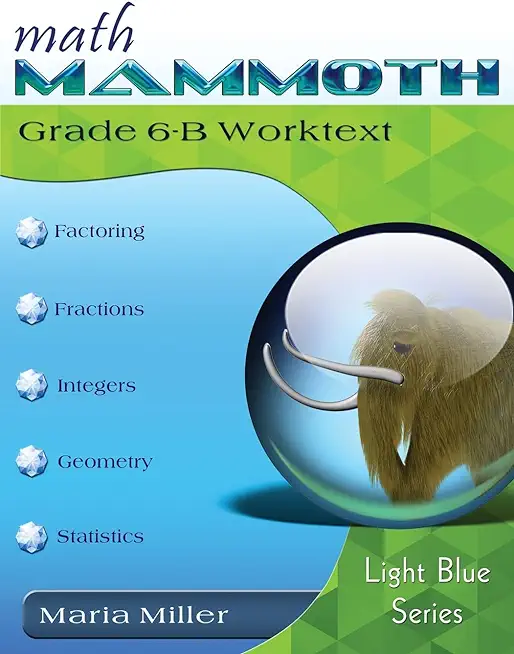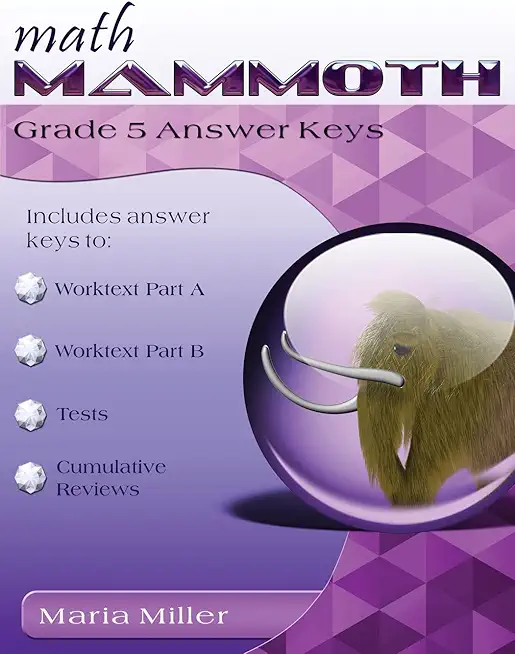
Math Mammoth Grade 6-B Worktext is the second student book in Math Mammoth grade 6 curriculum, meant for the latter half of 6th grade. This is the 2022 edition.
The main areas of study in Math Mammoth Grade 6-B worktext are:
- prime factorization, GCF, and LCM
- fraction arithmetic with a focus on division of fractions
- the concept of integers, coordinate grid, addition & subtraction of integers
- geometry: review of quadrilaterals & drawing problems; area of triangles & polygons; volume of rectangular prisms with fractional edge lengths; surface area
- statistics: concept of distribution, measures of center, measures of variation, boxplots, stem-and-leaf plots, histograms
Chapter 6 first reviews prime factorization and then teaches students two new concepts: the greatest common factor and the least common multiple. We also apply those concepts factor to simplify fractions and to find common denominators for adding fractions.
In Chapter 7, students first review addition, subtraction, and multiplication of fractions from fifth grade. Then we focus on a new topic: the division of fractions. The chapter also includes ample practice in solving problems with fractions.
Chapter 8 introduces students to integers (signed numbers). They plot points in all four quadrants of the coordinate plane, reflect and translate simple figures, and learn to add and subtract with negative numbers. (Multiplication and division of integers will be studied in 7th grade.)
The next chapter, Geometry, focuses on calculating the area of polygons. After a brief review of terminology for triangles and quadrilaterals and drawing fundamentals, this new topic is presented simply in a logical progression: first, the area of a right triangle; next, the area of a parallelogram; then, the area of any triangle; and finally, the area of a polygon. After that, students learn how to use nets of simple solids to calculate their surface area. Lastly, we turn to the concept of volume. Students have already learned to find the volumes of rectangular prisms in 5th grade. Now they calculate the volumes of rectangular prisms with fractional edge lengths.
The final chapter is about statistics. Beginning with the concept of a statistical distribution, students learn about measures of center and measures of variability. They also learn how to make dot plots, histograms, boxplots, and stem-and-leaf plots as ways to summarize and analyze distributions.
Features
- Math Mammoth focuses on conceptual understanding. It explains the "WHY", so your children can understand the math, not just learn "HOW" to do it.
- The curriculum is mastery-oriented. This means it concentrates fairly long on a topic, delving into its various aspects. This promotes conceptual understanding, as opposed to spiral curricula that often tend to jump from topic to topic too much.
- Very little teacher preparation is required.
- The curriculum has no separate teacher's manual nor is it scripted. The introduction to each chapter has some notes for the teacher concerning the material in the chapter. All the instruction is written directly to the student in the worktext, and there also exist accompanying videos where you can see Maria herself teach the material.
This is the full-color version of the worktext. Please note that it does not include the answers; they are sold as a separate book.
member goods
notems store

Kumon Math Boosters: Multiplication & ...
by Kumon Publishing North America
Paperback /Paperback$9.71






